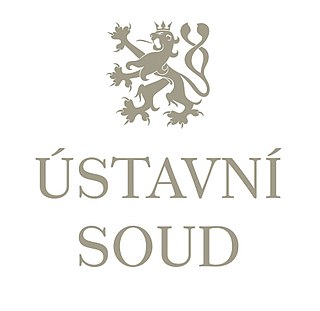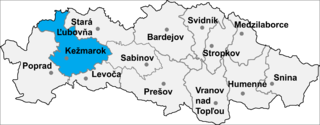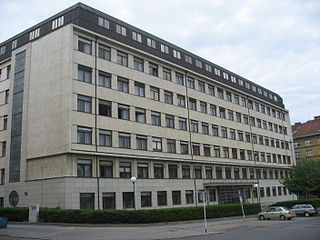
The Politics of Azerbaijan takes place in a framework of a semi-presidential republic, with the President of Azerbaijan as the head of state, and the Prime Minister of Azerbaijan as head of government. Executive power is exercised by the president and the government. Legislative power is vested in both the government and parliament. The Judiciary is nominally independent of the executive and the legislature. The state system of Azerbaijan defines the Constitution of the Republic of Azerbaijan. According to the constitution, Azerbaijan is a democratic, secular, unitary republic.

The Constitution of the Czech Republic is the supreme law of the Czech Republic. The current constitution was adopted by the Czech National Council on 16 December 1992. It entered into force on 1 January 1993, replacing the 1960 Constitution of Czechoslovakia and the constitutional act No. 143/1968 Col., when Czechoslovakia gave way to the Slovak Republic and the Czech Republic in a peaceful dissolution.

The Charter of Fundamental Rights of the European Union (CFR) enshrines certain political, social, and economic rights for European Union (EU) citizens and residents into EU law. It was drafted by the European Convention and solemnly proclaimed on 7 December 2000 by the European Parliament, the Council of Ministers and the European Commission. However, its then legal status was uncertain and it did not have full legal effect until the entry into force of the Treaty of Lisbon on 1 December 2009.

The Decrees of the President of the Republic and the Constitutional Decrees of the President of the Republic, commonly known as the Beneš decrees, were a series of laws drafted by the Czechoslovak government-in-exile in the absence of the Czechoslovak parliament during the German occupation of Czechoslovakia in World War II. They were issued by President Edvard Beneš from 21 July 1940 to 27 October 1945 and retroactively ratified by the Interim National Assembly of Czechoslovakia on 6 March 1946.
Peter Tomka is a Slovak judge of the International Court of Justice. Prior to joining the ICJ, Tomka was a Slovak diplomat.

Evangelos Venizelos is a Greek politician who was Deputy Prime Minister of Greece and Minister for Foreign Affairs from 25 June 2013 to 27 January 2015. Previously, he was Deputy Prime Minister and Minister for Finance of Greece from 17 June 2011 to 21 March 2012. He is a member of the Hellenic Parliament for the Panhellenic Socialist Movement (PASOK) for the first electoral district of Thessaloniki.

The Parliamentary Assembly of the Council of Europe (PACE) is the parliamentary arm of the Council of Europe, a 47-nation international organisation dedicated to upholding human rights, democracy and the rule of law. The Council of Europe is an older and wider circle of nations than the 28-member European Union – it includes, for example, Russia and Turkey among its member states – and oversees the European Court of Human Rights.
Sir Paul John Mahoney KCMG is a British jurist who was a Judge of the European Court of Human Rights. He was the first President of European Union Civil Service Tribunal (2005–2011).

Sir Nicolas Dušan Bratza is a British lawyer and a former President of the European Court of Human Rights.

The Constitutional Court of the Czech Republic is a specialized type of court which primarily works to protect the people in the Czech Republic against violations of the Constitution by either the legislature, government or by any other subject that violates people's constitutional rights and freedoms. In this respect, it is similar in functionality to the US Supreme Court, but is distinct from the Supreme Court of the Czech Republic. Of all the various levels of the Czech Judiciary it is the one created with the greatest specificity in the constitution.

Iulia Antoanella Motoc is a Romanian lawyer and international law expert, currently a Judge at the European Court of Human Rights and a professor at the University of Bucharest. Before beginning her service at the Court, she served as a Judge at the Constitutional Court of Romania. Motoc was UN Special Rapporteur for the Democratic Republic of the Congo and she chaired a number of international experts bodies and was Vice-President of the UN Human Rights Committee. On 1 October 2013, the Parliamentary Assembly of the Council of Europe elected Motoc a Judge of the European Court of Human Rights with respect to Romania. She received an absolute majority of votes cast by parliamentarians. Her nine-year term of office began on December 18, 2013.

Jean-Paul Costa is a French jurist and was the President of the European Court of Human Rights since 19 January 2007. He was first appointed a judge of the Court on 1 November 1998, and in 2009 was elected to serve an additional three years as President. His term at the Court ended on 3 November 2011.
Renate Jaeger is a German lawyer and a former judge of the European Court of Human Rights. Her term at the Court expired on 30 December 2010.
Ann Power is an Irish lawyer and academic, and from 2008 until 2014 was the judge in respect of Ireland at the European Court of Human Rights, the international tribunal tasked with enforcement of the European Convention on Human Rights amongst the Council of Europe's forty-seven Member States. Her term on the Court will end in 2014.

Dean Spielmann is a Luxembourgish lawyer and a former President of the European Court of Human Rights. He has been a Judge of the European Court of Human Rights in respect of Luxembourg since 2004, President of the Fifth Section of the Court since 2011 and was elected Vice-President and then, shortly afterwards, President in 2012. He is also a member of the Grand Ducal Institute of Luxembourg and has held academic posts at the universities of Luxembourg, Nancy and Louvain.
Anatoly Kovler is a Tajikistani-born Russian lawyer, former professor at the Academic Law University of the Russian Academy of Sciences and the judge of the European Court of Human Rights in respect of Russia. His term expired on 31 October 2012.
Helena Jäderblom is a Swedish jurist and civil servant. Since 2012, she has been a judge at the European Court of Human Rights.
















